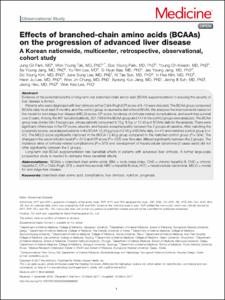KUMEL Repository
1. Journal Papers (연구논문)
1. School of Medicine (의과대학)
Dept. of Internal Medicine (내과학)
Effetc of BCAAs on the progression of advanced liver disease a Korean nationwide, multicenter, prospective, observational cohort study
- Keimyung Author(s)
- Chung, Woo Jin
- Department
- Dept. of Internal Medicine (내과학)
- Journal Title
- Medicine
- Issued Date
- 2017
- Volume
- 96
- Issue
- 24
- Abstract
- Evidence of the potential benefits of long-term oral branched-chain amino acid (BCAA) supplementation in reducing the severity of liver disease is limited.
Patients who were diagnosed with liver cirrhosis with a Child–Pugh (CP) score of 8–10 were included. The BCAA group consumed BCAAs daily for at least 6 months, and the control group consumed a diet without BCAA. We analyzed the improvements based on the model for end-stage liver disease (MELD) score, CP score, incidence of cirrhosis-related complications, and event-free survival over 2 years. Among the 867 recruited patients, 307 (166 in the BCAA group and 141 in the control group) were analyzed. The BCAA group was divided into 3 subgroups, whose patients consumed 4.15 g, 8.3 g, or 12.45 g of BCAAs daily for the analysis. There were significant differences in the CP score, albumin, and hepatic encephalopathy between the 2 groups at baseline. After matching the propensity scores, we analyzed patients in the BCAA-12.45 g group (12.45 g of BCAAs daily, n = 41) and matched control group (n = 41). The MELD score significantly improved in the BCCA-12.45 g group compared to the matched control group (P = .004). The changes in the serum bilirubin level (P = .014) and CP score (P = .033) over time also differed significantly between the 2 groups. The incidence rates of cirrhosis-related complications (P = .973) and development of hepatocellular carcinoma (2 cases each) did not differ significantly between the 2 groups.
Long-term oral BCAA supplementation has beneficial effects in patients with advanced liver cirrhosis. A further large-scale prospective study is needed to delineate these beneficial effects.
- Keimyung Author(s)(Kor)
- 정우진
- Publisher
- School of Medicine (의과대학)
- Citation
- Jung Gil Park et al. (2017). Effetc of BCAAs on the progression of advanced liver disease a Korean nationwide, multicenter, prospective, observational cohort study. Medicine, 96(24), e6580–e6580. doi: 10.1097/MD.0000000000006580
- Type
- Article
- ISSN
- 0025-7974
- Appears in Collections:
- 1. School of Medicine (의과대학) > Dept. of Internal Medicine (내과학)
- 파일 목록
-
-
Download
 oak-2018-0442.pdf
기타 데이터 / 381.13 kB / Adobe PDF
oak-2018-0442.pdf
기타 데이터 / 381.13 kB / Adobe PDF
-
Items in Repository are protected by copyright, with all rights reserved, unless otherwise indicated.